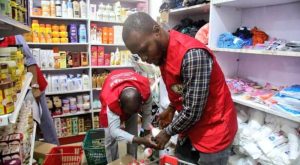Health
India Bans Deadly Opioids After BBC Exposé on West Africa’s Drug Crisis

- Aftermath of BBC investigations on deadly opiods
- India Bans Two Opioids Behind West Africa’s Drug Crisis
- NDLEA asked to take action
Indian authorities have banned two highly addictive opioids following a BBC investigation that exposed their role in a public health crisis in parts of West Africa.
- EDITOR’S PICK
- 2025: A Glimmer of Hope Nigeria?
- Trapped in Fear Nigerians Cry Out Over Deportation Policy
- Opeifa: The Railway Man
A letter from India’s Drugs Controller General, Dr. Rajeev Singh Raghuvanshi, confirmed the immediate withdrawal of manufacturing and export permissions for the drugs. The decision was influenced by an inquiry into their potential for abuse and harmful effects.

The BBC’s investigation revealed that Mumbai-based Aveo Pharmaceuticals had been illegally exporting a dangerous mix of tapentadol, a powerful opioid, and carisoprodol, a muscle relaxant so addictive that it is banned in Europe. The combination, unapproved for medical use anywhere in the world, poses serious risks, including breathing difficulties, seizures, and fatal overdoses.
Despite these dangers, the drugs have gained popularity as cheap and widely available street substances across West Africa. In Nigeria alone, where opioid abuse affects an estimated four million people, the pills have flooded the market.
Export records show Aveo and its sister company, Westfin International, shipped millions of these tablets to Ghana and other West African nations.
BBC journalists, conducting undercover operations, filmed Aveo’s director, Vinod Sharma, inside a factory in India, openly discussing the addictive nature of the drugs.
When the operative, posing as a businessman, suggested selling the pills to Nigerian teenagers, Sharma responded indifferently, acknowledging the product’s harmful effects but calling it “business.”
Following the revelations, India’s Food and Drug Administration raided Aveo’s facility in Mumbai, seizing its entire stock and halting production. Officials have vowed to take further legal action against those involved and intensify inspections to prevent further illegal drug exports.
- FURTHER READING
- Albinism Community Urges Action as Skin Cancer Cases Surge
- FG Extends palliative programme to Support Students, DCT Residents
- Adiyan Water Works Project 80% Completion Excites Sanwo-Olu
The agency emphasized its commitment to protecting public health and maintaining India’s reputation, pledging to crack down on illicit pharmaceutical activities.
Click Here For Video of The Week
Advertise or Publish a Story on EkoHot Blog:
Kindly contact us at ekohotblog@gmail.com. Breaking stories should be sent to the above email and substantiated with pictorial evidence.
Citizen journalists will receive a token as data incentive.
Call or Whatsapp: 0803 561 7233, 0703 414 5611







